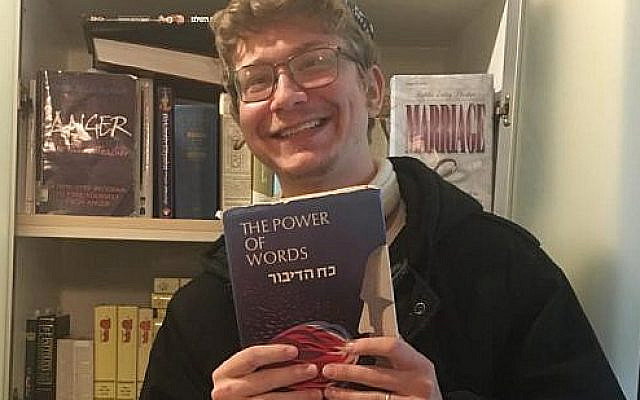Is Social Media Ruining Us?
בס”ד
Ain Hara… or Hurtful Words?
A recent re-read of one of my favorite books – The Power of Words by Rabbi Zelig Pliskin – has gotten me thinking.
I’ve gotten a lot of teasing from friends about my fear of “Ain Hara”, the evil eye. There is such a concept in Judaism that it is not beneficial to brag or show off because if someone is jealous and gives you the “evil eye” you can be negatively affected.
The question I want to explore is, what about them? Aren’t they negatively affected? Not on some spiritual, abstract level, but in a real and immediate emotional way? What does that do to them? What does that to do their day? When a healthy mother of 5 or 6 children posts pictures of her children, what does that do to a barren woman who sees that? In a generation where people all over the world can see whatever we want them to, are we all just desperately showing off the best parts of our lives, all meanwhile secretly jealous of everyone else?
This question, and its answer, are subjects that deserve an entire book devoted to them, but for now, we will have to suffice with a brief overview. And although I am not an expert sociologist, I will offer my opinion and hope it will resonate with those reading.
Perhaps I have a fear of resentment. Perhaps I have a fear of rejection. Whatever the case, I have veered towards becoming an increasingly secretive person as the years go on. I posted (and made) no announcement about aliyah. I didn’t post anywhere about my engagement or any pictures of my wedding. I’ve learned the hard way not to tell anyone about a potential job prospect until I have the job, and I’ve done my very best to be careful to whom I tell anyone’s good news.
Why? Because of Ain Hara? Is it really that bad?
I’d like to posit that whether or not Ain Hara is significant is not the point. Rather, it is an issue of onaas dvorim, a Torah prohibition against causing pain with words. (Speaking positively can have an amazing effect.) In his book, The Power of Words, Rabbi Pliskin makes the point that if we make a joke and we find it funny, but it comes at the expense of another person’s pain, then it isn’t really amusing. Or more accurately, our pleasure is not to come at the expense of another person’s pain. Similarly, while it is totally appropriate to be happy on our special occasions and even spread the simcha, I question the wisdom of sharing that simcha with hundreds to even thousands of acquaintances online, many of whom will be unable to feel happy for you, and some that may even resent you.
If spreading our good fortune will cause us pleasure, but cause others pain, it would seem to be of primary importance to be cautious when it comes to the specifics of how we express our simcha.
A good practice to develop is the habit of not sharing the news with singles that other singles have recently gotten engaged. When we examine such a case closely, we can find it to be quite discouraging and insensitive. We are, in effect, saying to the single, “You haven’t gotten married yet, and everyone else has,” or so it may seem to the single, regardless of how pure our intentions.
True, we ourselves have to work on being happy for others. But that is our own work, and we should not presume that others are at such a high level of self-nullification as to not feel any lacking.
The danger of comparing our lives to the lives we think people online lead cannot be overstated. Youth are jealous of other youth regarding their parent’s purchases, young adults are jealous of the relationships they see, and adults are jealous of the families and vacation photos they are constantly bombarded with on their phones.
Is the warm sensation in our chest when we get likes worth the pain we might be causing someone?
The thing to remember in all this is that IT IS NOT REAL. The snippets you see out of people’s lives are the snippets they want you to see. You have no idea what the person on the other side of the phone is thinking.
With this in mind, it is important to be almost hyper-conscious of what we post, and where we post it too. When we share good news with good friends, we can assume they will be happy for us. But when we share that same news with acquaintances and strangers, who knows what we will be making them feel? Is the warm sensation in our chest when we get likes worth the pain we might be causing someone?
Where am I going with all this?
It doesn’t matter whether Ain Hara is a real, tangible thing or not. Because a lot of the time, it’s not about Ain Hara at all… It’s about enhancing our sensitivity to what others lack, and how grateful we should be to have it. It’s about knowing that your special moments in life belong to you and the special people in your life, not naked for the world to behold. Finally, it’s about a level of modesty, and elevating ourselves to a higher stage of morality, so that we can truly and properly keep the commandment of Vayikra 19:18, Loving our fellow man as we love ourselves.
To hear my co-host and I speak more about Rabbi Zelig Pliskin you can listen at the following links (Or wherever Podcasts are found):
___________________________________________________________________________
Ethan Yakhin is the co-host of Open Book with Eitan and Itai, a Podcast both with and about Jewish Authors. To stay updated on upcoming episodes, you can follow Open Book on Instagram. The show is available wherever you listen to podcasts. You can have a look here at their podcast page.
Are you an Author interested in coming on the show? Contact Us.




